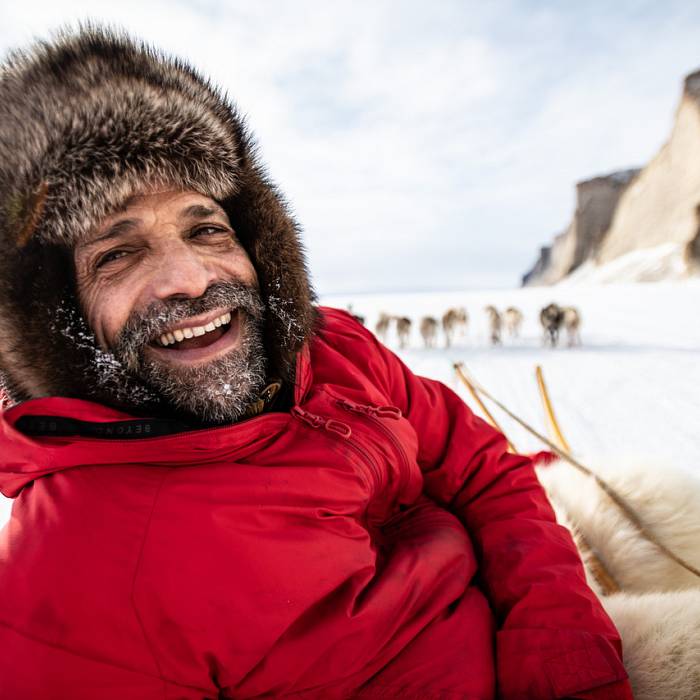Greenland: Where Ice is Born
Program Overview
At 6:30pm, Lonnie will give a 1 hour presentation on Greenland and introduction to the upcoming sailing expedition ‘Nord Hus’ projected to leave Grand Marais harbor this spring. Q&A will follow.
This program is being offered as a part of our First Friday Series! Come down to the commons beforehand for community gathering and dinner on a stick, 5:30-6:30pm.
Greenland: Where Ice is Born
It has been 23 years since Lonnie Dupre and John Hoelscher completed the first and only circumnavigation of Greenland; a 5,500-mile journey all non-motorized by dog team and kayak.
In 2022 Dupre went back to NW Greenland to document through film the Polar Inuit culture. Traveling from village to village by dog team, Dupre re-connected with his past polar Inuit friends to find out how their culture has changed as a result of climate change and modernization over the last two decades.
The Polar Inuit are unsung heroes of countless Arctic expeditions. Their ingenuity and innovation through trial and error and creative ways of improvising has always amazed Lonnie on past expeditions.
"The Polar Inuit people make it seem easy to live in a place, that otherwise appears inhospitable to us. Traditions that have been passed on for thousands of years; by dressing in furs and by forming a symbiosis with their sled dogs, they managed to live off the land, completely in tune with their environment of ice and snow. These people are not run by a clock; they do things when the time seems right. People are seen as equal, no person should be perceived as better than another.
I was shocked at how drastic global warming has effected the land and culture. Permafrost melting is undermining foundations of houses, ice caps and glaciers have receded so much that new maps are required to identify the distorted coastline. Sea ice in the Inglefield Fjord that was once 7 feet thick in mid-winter is now 18 inches. At this current rate of melt, the fjord will be ice free in 7 to 10 years. In the mountainous and ice cap terrain, the Inuit rely on sea ice to travel between villages and for hunting. Once the ice is gone, the Inuit will become land locked, held prisoners in their own villages unable to travel for 8 months out of the year.
Western Technology is also tugging at the culture. Boats with motors, snow machines taking place of sled dogs, modern clothing replacing furs, Facebook and smart phones consuming time. On the bright side, there are still individual holdouts keeping their culture alive". -Lonnie Dupre
What’s next?
The stories of adventure from ‘The Age of Polar Exploration’ when Peary, Amundsen, Nansen, and Shackelton made discoveries of the North and South Pole, Northwest Passage and Greenland opened my imagination of the far corners of our world. Loving all things winter and knowing there were still discoveries left un-done, launched my Arctic career 35 years ago. One thing all these explorers had in common; they used ships built for cold and ice to transport team and supplies closest to their goals. Nowadays most science teams, adventurers and goal seekers rely on aircraft. I’ve always donned this sentimental desire, a nostalgia to go north in my own ship, supporting and suppling my own expeditions like they did 100 plus years ago. What it feels like to start from your hometown. To feel the distance, the voyage, connection to the sea and cultures. To ultimately wedge the ship in as far north as we can go with the goal of filming, storytelling and the tangible laying of supply depots for future expedition by ski and dog team. Thus conceived the NORD HUS expedition.
Program Dates
- Fri, Apr 4, 2025 – 5:30 - 8:00pm

